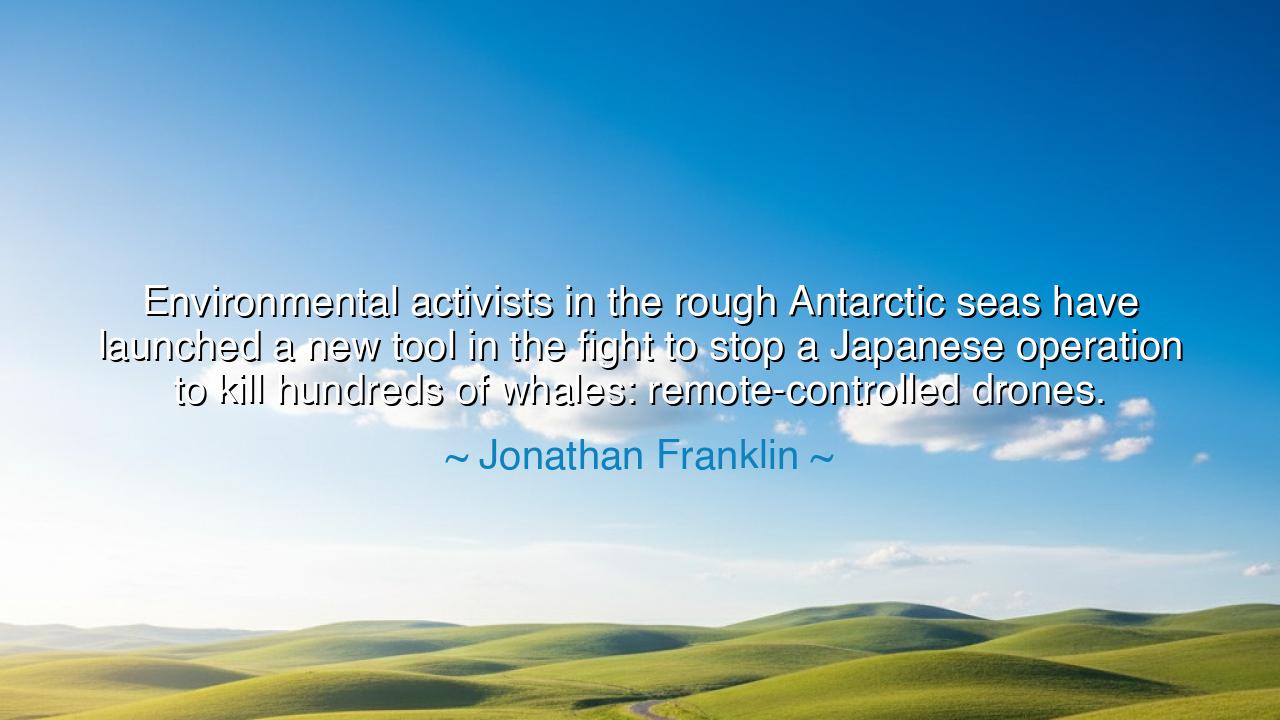
Environmental activists in the rough Antarctic seas have launched
Environmental activists in the rough Antarctic seas have launched a new tool in the fight to stop a Japanese operation to kill hundreds of whales: remote-controlled drones.






In the chronicles of human courage, few endeavors are as stirring as the defense of the natural world. Jonathan Franklin observes with keen awareness: “Environmental activists in the rough Antarctic seas have launched a new tool in the fight to stop a Japanese operation to kill hundreds of whales: remote-controlled drones.” Here lies a tale of valor, of ingenuity, and of the unyielding human spirit confronting both peril and injustice. The oceans, vast and ancient, hold life that has endured for millennia, yet human ambition threatens these creatures. In response, those who honor the balance of nature wield knowledge and technology as weapons in the sacred struggle for survival.
From the earliest civilizations, humans have recognized the importance of protecting the living world. In ancient Egypt, laws were written to safeguard fish in the Nile; in Greece, certain sacred groves were untouchable, regarded as havens for both spirits and wildlife. These precedents remind us that stewardship is a calling older than empires. The use of remote-controlled drones by modern activists is the continuation of this ancient principle: to defend life, to bear witness, and to act with courage and ingenuity against forces that would cause harm.
Consider the story of the whalers themselves. For centuries, whales were hunted with harpoons and sailboats, often decimating populations to near extinction. The 20th century brought regulations, yet illegal and unethical practices persisted. Activists, confronting these threats, adapted with the tools of their age. Just as the ancients innovated with bronze weapons or the invention of the compass opened new voyages, today’s defenders employ drones to monitor, document, and disrupt operations that would destroy life. This is a testament to human resourcefulness when guided by moral imperative.
The Antarctic seas are no gentle waters; they are vast, cold, and unforgiving. To venture there is to face not only the elements, but also the consequences of human greed and exploitation. The courage of environmental activists mirrors that of ancient mariners, explorers, and warriors who risked life and limb to uphold justice, chart unknown lands, or protect the weak. In using remote-controlled drones, these modern guardians extend their reach and their vision, embracing technology to confront challenges that were once insurmountable.
This story illuminates the enduring principle of vigilance in defense of what is sacred. From the forests of ancient Europe to the coral reefs of the Pacific, those who have recognized the value of life have acted to protect it. The whales, leviathans of the sea, symbolize the majesty and vulnerability of nature. Franklin’s observation reminds us that progress and tools are only meaningful when coupled with conscience: it is not the device itself, but the purpose and courage of its wielder, that shapes the fate of the world.
The lesson for future generations is profound: in the face of threats—whether to life, the environment, or justice—humankind must combine bravery with innovation. Ancient societies who failed to safeguard their lands and creatures suffered famine, decline, and ruin. Today, the oceans call for vigilance, and those who heed the call demonstrate that knowledge, ingenuity, and courage can confront even the most daunting of human misdeeds. The fight to protect whales exemplifies this timeless struggle, blending the wisdom of old with the tools of the present.
Practically, this teaching invites action and mindfulness. Support conservation initiatives, educate oneself about the plight of endangered species, and embrace technology as a force for good. Observe and document injustice where possible, and advocate for policies that defend life and ecosystems. Each act, whether large or small, contributes to a continuum of stewardship that stretches across generations, embodying the ancient ideal of protecting the weak, the sacred, and the living world.
Thus, Jonathan Franklin’s words echo across time: “Environmental activists in the rough Antarctic seas… launched remote-controlled drones to stop the killing of whales.” Let this serve as a timeless teaching: courage, innovation, and moral purpose are inseparable. The tools we wield, guided by conscience, can defend the majesty of the natural world, and through such action, humanity honors both the past and the promise of future generations.
I can also create a more oral, epic version of this reflection, with rises and falls in cadence, vivid imagery, and rhetorical emphasis, giving it the feel of a timeless ancient teaching—perfect for narration or meditation. Do you want me to make that version?






AAdministratorAdministrator
Welcome, honored guests. Please leave a comment, we will respond soon